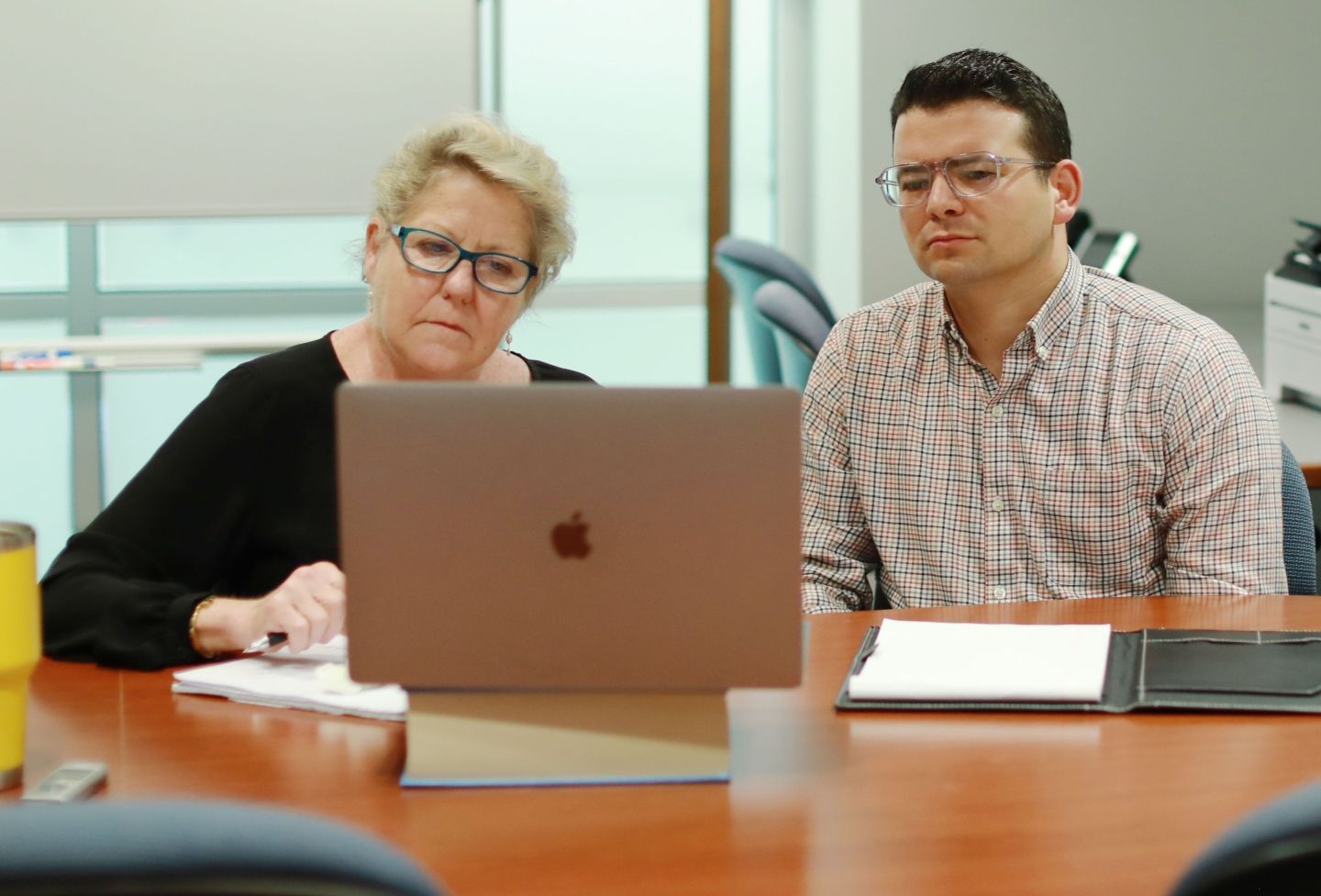Student Advocacy Project Gives State Employees a Voice

When a Virginia state employee was disciplined for posting documents to her employer's Web site at the direction of a superior, she found help from an unlikely place-Law School students eager to get experience in a real employment law case.
"What happened to her was pretty harsh, given the facts. So, our whole theory was that it was a little unreasonable to slap her on the wrist that harshly," said second-year law student Matt Pinkham, who worked on the case. "There's an exception for mitigating circumstances and we felt that it applied."
Pinkham, along with first-year law student Dan Cardy, both volunteer with the School's Law Student Advocacy Project (LSAP), a program that coordinates with the Virginia Department of Employment Dispute Resolution (EDR). EDR offers a formal grievance process for state government employees to resolve employment disputes, such as a disciplinary action or dismissal from work.
The state employee in this case opted to use the grievance procedure after receiving a formal discipline from her supervisor which she believed was unfounded. Her supervisor issued a formal reprimand citing that she did not follow his instructions that all Web postings must first be approved by him, even though her supervisor's boss was the requestor. The case made it to the hearing stage and the employee was referred to LSAP for help.
Both Cardy and Pinkham were drawn to the project to gain real-world experience and to make a difference in the life of their clients. After carefully researching and constructing their argument, they represented the grievant in a hearing at her place of employment. The team highlighted the pertinent facts of the case that they had collected from the client. Prior to the hearing, John Davidson, a UVa law alumnus, and local attorney reviewed their arguments as he does with all LSAP cases.
"We showed up and the [hearing officer] was already there with his laptop and he had a tape recorder with five microphones extended every place in there so that he could record everything that was said," Cardy recalled. "As time went on [in the hearing], it began to feel natural. As I was going, I knew what had to be done."
Cardy, Pinkham, and the other law students who help in such cases fight in a notoriously difficult area of law. In general, nine out of 10 cases are turned down in real practice, and of those, less than half are winnable. For clients, knowing one's rights when a conflict arises in the workplace can be a difficult undertaking, especially if they are not an attorney, not to mention costly if a lawyer is needed.

LSAP student advocates "give people a voice in the [grievance] process who otherwise would feel intimidated or unsure of what to do," said second-year law student Sarah Pendergraft, director of LSAP. "They bring a lot of the advocacy skills and the linear thinking to bear and offer a better defense than people might be able to come up with on their own."
Pendergraft, who was interested in employment law even before law school, got involved in the project as a first-year law student and took on a leadership role this year. As director, Pendergraft works directly with EDR, performing intake interviews with potential clients and pairing them with a student team.
"We have a really good working relationship with EDR in Richmond," Pendergraft said. "They've been really active in getting law students involved and letting people know about the program, making it easier for us to get clients, but also for folks to get some kind of representation." LSAP took on six cases this year alone.
Gretchen White, an EDR Consultant who refers state employee grievants to LSAP, fosters the same win-win attitude toward LSAP.
"The students are providing [aggrieved] employees with a real benefit; they should feel good about that," White said. "Not only is this a great opportunity for students to get real-world experience and real-world law skills, they have to really understand the client's story."
People who turn to LSAP are typically at a low point in their lives because they are either being disciplined at work or are losing their jobs, White noted, often putting them in a deeply concerned or even scared state of mind. They appreciate someone who understands the legal process, and even more that their need to tell their stories is met.
Although the students are getting real-life experience in arguing, the hearings procedures differ from courtroom litigation. The students don't have a discovery process, for example, and they generally don't get to talk with the opposing party. White explained that as a result, students gain valuable experience in "thinking on their feet."
Rip Verkerke, the faculty advisor for LSAP and one of the initiators of the program, is excited by the growth and success of the completely student-run organization. "I am incredibly impressed with the ability of the students to manage this program on an ongoing basis and sustain it by themselves. They are responsible for what is essentially an informal clinic. Although they don't get any academic credit for it, they do it anyway."
The experience the students gain from working on LSAP projects is invaluable, Verkerke noted. They aren't just handed a case where all the facts are developed. The students have to actually develop the facts within a few weeks to a month-a challenging and time-consuming task. Students dedicate at least 25-30 hours of their time within this short time frame.
"If you win or lose, I don't think that's so important to the educational value of the experience," Verkerke said.
Realizing that their performance in the hearing could affect a real life was nerve-wracking for both men, but their preparation paid off. In the end, the hearing officer sided with the grievant and Pinkham and Cardy came away with more than just a great educational experience and a win. They assumed the role of advocate and saved the employee from a damaging disciplinary action. Cardy received the official decision through e-mail and was the one to give the grievant the good news. She was very happy and gave profuse thanks, he said.
"This is the most lawyer-like thing I've done in law school," Cardy said. "I learned a lot of things I knew in the abstract, but it's kind of different once you see it. I learned why it's so important to, for example, have things in writing."
"It was a confidence booster," Pinkham said. "We put in a lot of work, and the fact that it paid off is gratifying."
Founded in 1819, the University of Virginia School of Law is the second-oldest continuously operating law school in the nation. Consistently ranked among the top law schools, Virginia is a world-renowned training ground for distinguished lawyers and public servants, instilling in them a commitment to leadership, integrity and community service.


